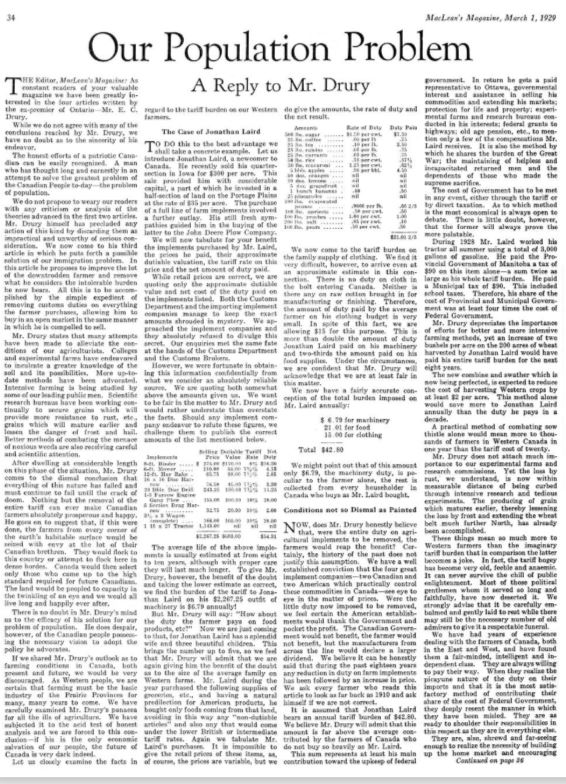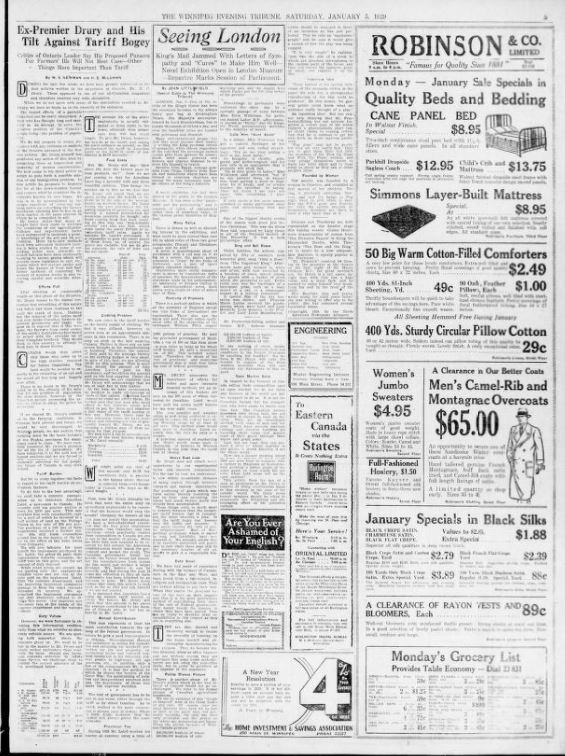In 1929 McLuhan’s father, Herbert Ernest McLuhan (1879-1966), writing with W.S. Newman1, published an article in Maclean’s magazine, ‘Our Population Problem’.2
A version of the article, without its last section, appeared earlier in the The Winnipeg Evening Tribune.3
The article reviewed proposals intended to help farmers made by Ernest Charles Drury, the Premier of Ontario from 1919 to 1923. Drury had been Premier as the leader the United Farmers of Ontario party. The Newman-McLuhan piece rejected Drury’s contention that tariffs imposed to encourage Canadian manufacturing were an unsupportable burden on agriculture. At the same time (as indicated by the title, ‘Our Population Problem’) they argued that it was Canada’s small population which limited its manufacturing potential and that tariffs were not decisive for it, either.
The article anticipates a point that would be at the heart of Marshall McLuhan’s work throughout his career. The authors regret the lack of understanding of the west by the easterner, Drury. Similarly, they detail a lack of understanding of farm life by a politician — even a United Farmers politician. Like his future UT colleague, Harold Innis, Marshall McLuhan would treat problems of this sort as imbalances between centre and margin. And he would argue that such imbalance was a defining characteristic of the analog Gutenberg galaxy, while centre-margin balance was the essence of the digital Marconi era. The concluding lines of the Newman-McLuhan Maclean’s article nicely illustrate the principle at stake:
solutions are doomed to failure which are based upon the continued hostility of Canada’s two premier industries — agriculture and manufacturing. These industries are absolutely interdependent and therefore the only policy which can ever hope to succeed is one which replaces friction with harmony and has co-operation for its keynote.4
A lack of balance, aka friction, causes practical problems which cannot be put right by policies which themselves lack balance. Both practice and theory must instead be grounded in harmony. Ultimately, all such questions concern the nature of reality for it is the fundamental characteristic of all oppositions to be “absolutely interdependent”. Absolutely — that is, at the end of day, all things considered, ontologically.
The great problem, of course, concerns the nature of the relation of friction and harmony themselves: are these, too, “absolutely interdependent”? How not, if their relation is ultimately a matter of reality itself? But how so, when friction so often overwhelmingly asserts itself against harmony?5 How, then, get a handle on such a deep and perplexing problem, especially when it has enormous practical implications?
Herb McLuhan’s 1929 article, and doubtless his thinking in general, may be taken as a springboard from which Marshall McLuhan’s intellectual life took off. He would investigate how the tradition had considered the friction/harmony riddle and how communication about it had broken down in modern times — even awareness that such consideration existed at all. The imperative question was how communication of the two with each other and of the riddle of their relation with our contemporary lives might be repaired and the riddle considered once more.6
- Newman, apparently a pal of Herb McLuhan, appeared frequently in the conservative newspaper in Winnipeg, The Tribune, with poems lampooning the Liberals. Marshall McLuhan was a paperboy for the Tribune in the 1920s, but later developed a relation with the Winnipeg Liberal newspaper, The Free Press. ↩
- ‘Our Population Problem’, W.S. Newman and H.E. McLuhan, Maclean’s, March 1 1929, 34 & 38. Thanks to Jarrett Cole for the tip. ↩
- ‘Ex-Premier Drury and His Tilt Against Tariff Bogey‘, W.S. Newman and H.E. McLuhan, The Winnipeg Evening Tribune, January 5, 1929, 5. ↩
- ‘Our Population Problem’, 38. ↩
- McLuhan’s appreciation of James Joyce must be situated in this context, for the relation of Stephen to Bloom turns on it, as does the ebb and flow of Finnegans Wake. ↩
- Of course, the question is itself an instance of the riddle. For if the relation with the tradition has become one of friction, how is that to be considered harmoniously without fundamental distortion? ↩

